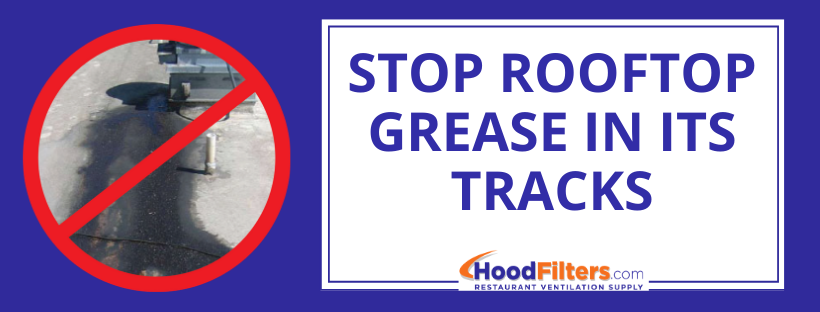If you have rooftop grease buildup, it’s important not just to clean it up, but to determine what is causing it so that you can stop it before happens. Rooftop grease can lead to a whole host of problems including structural damage, slip and fall accidents for maintenance and inspection crews, fire risk, and environmental health hazards. Let’s take a look at the top three reasons for rooftop grease and how you can fix the problem.
Where does rooftop grease buildup come from?
It doesn’t matter if you’re a food truck, a cafeteria, a four-star restaurant, or a drive-through franchise, nearly every commercial kitchen produces grease from their cooking. Cooktops, griddles, grills, woks, fryers, and even low heat rotisseries will release airborne fats, oils, and grease. So where does all of that grease go? If your ventilation system is working properly, most of it gets sucked up into your vent hood and exhausted by a upblast exhaust fan.
Most of the fats, oils, and grease (FOG) from your cooking should be removed from your restaurant hood system by your grease filter. However, some will inevitably make it through and will end up on the walls of your air ducts as well as the blades of your upblast exhaust fan. This is expected. But what if you notice grease on your roof? Why is it getting there, and what can you do to stop it?
1. Your exhaust hood filters are dirty.
As we mentioned, most of the grease should be captured by your exhaust hood filters before it ever has a chance to enter your ducts and get exhausted by your upblast exhaust fan. But if your restaurant hood system is unable to do its job correctly, grease can and will get into the rest of your system where it can quickly build up and wreak havoc, causing all kinds of problems from an increased fire risk to a reduced airflow. Dirty exhaust hood filters are less effective at containing grease; therefore more grease enters your restaurant hood system.
Upblast exhaust fans that are exposed to increasing amounts of fats, oils, and grease may begin to leak that grease out onto your rooftop. While it is certainly advised to follow code recommendations for a NFPA 96 hood cleaning frequency based on the type of cooking, you should also closely monitor and evaluate the cleanliness of your exhaust hood filters and adjust your cleaning schedule as needed. It’s not just about keeping grease off or your roof. Regular cleaning of exhaust hood filters helps your hood and fan system maintain proper airflow and ensure optimal performance of your entire restaurant hood system.
2. Upblast exhaust fan is leaking.
If your rooftop grease is not being caused by dirty hood filters, there is a very good chance it’s due to your rooftop ventilation fan is leaking. While sometimes, this is caused by a physical problem with the fan, more often than not, it is caused by a lack of proper rooftop ventilation fan cleaning. Most of the time, it’s a combination of both dirty hood filters and a dirty fan, as the two basically go hand in hand.
Just like with hood filters (and your duct work!), it is really important to keep your upblast exhaust fan cleaned and maintained to avoid grease build up. When fan blades become coated with grease, it can cause the fan to become unbalanced and will interfere with the upblast exhaust fan’s ability to exhaust polluted air. When too much grease builds up on a fan, it will begin to leak out onto the roof. Using a rooftop grease containment system around your upblast exhaust fan is an excellent way to protect your roof just in case, but the goal is always to keep the grease from ever leaking out in the first place.
3. There’s a problem with your rooftop ventilation fan grease catcher.
The last most common reason for rooftop grease buildup is a problem with your exhaust fan grease box, or for some facilities, not even having one installed. Without a exhaust fan grease box on your fan, any grease that reaches your fan blades is likely to immediately begin leaking out onto your rooftop.
Even though exhaust fan grease boxs are required by law, many restaurant and commercial kitchen owners have no idea that their system is lacking one because they rarely set foot on the roof of their establishment.
If you don’t have a exhaust fan grease box in place, you definitely need to install one; and we don’t mean a bucket or catch pan. A exhaust fan grease box needs to be protected from the elements, securely attached to your fan, and meet NFPA 96 fire codes for commercial kitchens. Exhaust fan grease boxs are not expensive and they are easy to install.
As a preventive measure, it’s a no-brainer. You can go with a simple grease box or for busy kitchens producing larger amounts of grease, something like the Omni Grease Gutter or the DRIPLOC Rooftop 360 Grease Containment System might work best for you.
In Conclusion
We know that managing and running a commercial kitchen is tough work. Keeping grease from ever reaching your rooftop in the first place is the best way to avoid unnecessary problems that would cost you money and time to deal with. If you have grease buildup around your fan or on your roof, it’s probably being caused by dirty hood filters, a dirty rooftop ventilation fan, or a lack of proper grease containment.
Watch this short video to learn more:
Do you need help finding the right rooftop grease containment system or exhaust fan grease box for your restaurant hood system? Live chat online, send an email to customerservice@hoodfilters.com, or just give us an old fashioned phone call at 877-394-9731. Our product specialists and customer support team are here to help!


